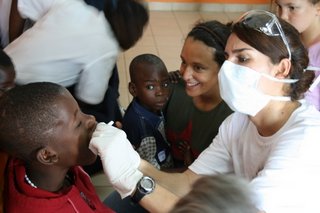LIBREVILLE, Gabon -- When the unarmed medical teams from the amphibious ship U.S.S. Nashville arrived for a scheduled visit at Centre-Arc-en-Ciel, a children's shelter in this lush West Africa capital, the roughly 20 children there panicked. They fled into the shelter's boys' dormitory, one tiny boy even curling up into a ball on the bottom shelf of a locker. Seeing the uniforms, some of them camouflaged like army uniforms, the children thought the sailors were carrying guns, explained Gabriela Escudero, a humanitarian liaison from the U.S. embassy in Libreville. "They've had difficult lives," Escudero said. With some coaxing, Escudero showed the kids that the sailors were unarmed and meant no harm. Within minutes, the children had warmed to their visitors. One boy asked the Americans, in French, if they liked Jackie Chan movies. Together, Centre-Arc-en-Ciel and a nearby dormitory for girls house some 30 "street children," as Escudero described them. They range in age from three to 18. Some are local runaways. But many, she said, are the victims of international human trafficking, a persistent, under-reported and neglected problem in West Africa. The April 16 visit from Virginia-based U.S.S. Nashville's teams, numbering around 20 people combined, represented the first thorough medical care that Centre-Arc-en-Ciel's children had ever received.
War is Boring: U.S. Navy Renders Aid to Gabonese Trafficking Victims

